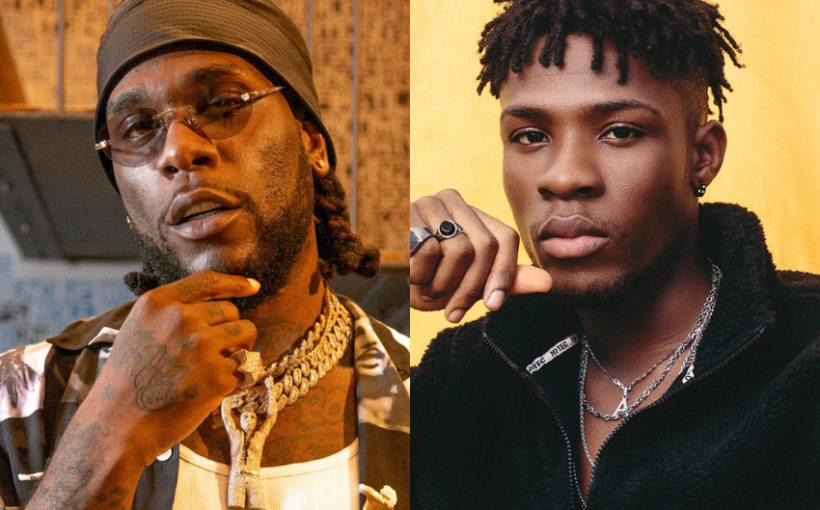When Burna Boy released his summer hit, ‘Last Last,’ which sampled Toni Braxton’s ‘He Wasn’t Man Enough,’ music enthusiasts could not help but discuss how Igbo (weed) and Shayo (alcohol) were the go-to solace for a broken-hearted man. Every time the Grammy-winning star was seen smoking, it was attributed to his break up with his ex-girlfriend, Stefflon Don, and the concept of drinking to a stupor and using drugs to let go of the pain appeared to have been normalised. At some point in 2022, the music star launched a cannabis brand called ‘BrkFst’ in the US.

With this launch, he simply implied that taking this substance which he named ‘Breakfast,’ will be the solace a broken-hearted person will need. He did not need any other message to sell this message. The song he had released prior to releasing the cannabis brand had clearly stated his message – a message that mindless young adults will take as the gospel truth considering his place of influence.
In the same vein, Joeboy’s seemingly innocent lyrics of sipping his alcohol to get away from pain became a trend that led many of his fans who are mostly young people to the hospital and led some to do absurd trends that had them drinking harmful substances all in the name of following a trend set by a pop star.
Over the years, the same concept has been used and reused with songwriters glamourising and normalising the use of drugs. Nigerian rapper Olamide referred to them as Science Students in a single, which got banned for the glorification of substance abuse.
The National Drug Law Enforcement Agency (NDLEA) revealed in 2021 that 40% of Nigerian youths between 18 and 35 years are deeply involved in the abuse of drugs. Corroborating this revelation is another report by the United Nations Office on Drugs and Crimes (UNODC) revealing that Nigeria has a 14.4% drug use prevalence, a number significantly higher than the global average.
From the statistics above it is obvious that there is a pending drug problem. Every young adult has at least one friend that smokes or uses drugs illicitly, and everyday pop culture stars, a major influence on the younger generation, are normalising the eccentric use of drugs as a form of getaway from reality through songwriters.
Whether music stars and songwriters like to hear this or not, they are influencers, and they shape the culture. It has become taboo to not want to drink or use drugs because everyone thinks it is only normal as a young adult for you to do one, those who don’t are seen as abnormal and their youthfulness is constantly subjected to scrutiny. ‘What do you then do for fun?’ Many young people who don’t do drugs and alcohol have been asked.
With the proliferation of television, social media content, it has become virtually impossible for young adults to be completely protected from these vices. However, the glorification of drugs needs to end.
In the past years, music stars like Juice Wrld, Mac Miller, and many more have lost the battle to substance abuse, with many stars going through rehabilitation to finally get themselves in shape. At a time in 2019, Wizkid, one of Nigeria’s leading artistes had tweeted ‘Stay off drugs kids! Pleaseeee.’
Although he still seems to be smoking heavily in the public eye, it is an indication that there is something significantly wrong, and this is from a personality who earns millions of naira and can afford the best healthcare in any part of the world.
In recent times, artistes like David Jones David, through their music have remained committed to writing songs that do not, directly and indirectly, glamourise substance abuse. This is exactly a view of artistry worth emulating, whether it is a conscious decision or not, it sends a message that substance abuse is not the way.
With artistes like David Jones and many more releasing music that is solely based on quality songwriting with care to the crafting of their words, many songwriters could also take a queue. Whether music creatives like it or not they are a force of influence, and it’s important that they vet their message and ensure that it tells the right story. Everyone with a platform has a responsibility to use their platform positively.
Although there are initiatives like MTN ASAP that aims to sensitise young adults on substance abuse, the message they are telling can reach only a limited number of people without the help of pop culture influences – music, films, and many more – the right message has to be told, substance abuse is not ‘cool’ and it should not be glamorised whether with lyrics, in music videos or in films.
The post Anti-Substance Abuse: How Nigerian Songwriters Can Use Their Craft For Advocacy appeared first on Nigerian Entertainment Today.



